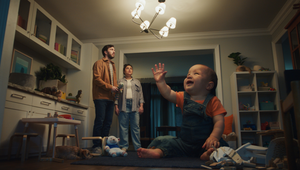
How Scared Should You Be of the Frightful Five?

Last week I asked how have the 'The Frightful Five' - Amazon, Apple, Facebook, Microsoft and Alphabet (Google’s parent company) - have impacted the advertising industry. This week the very definition of these companies has been called into question by the US Congress. The genie is out of the bottle and it doesn’t seem that we can stuff it back in, or fundamentally understand what it wants from us.
The Congress have called the tech giants to Capitol Hill to answer for the extremist content and the impact on the US elections. Facebook recently revealed that 80,000 posts from Russian-backed Facebook accounts reached potentially a third of all Americans between 2015 and 2017, according to reporting by the NY Times. Facebook are saying that approximately 126,000,000 people may have been served a story during the two year period.
Now in Washington, Congress is asking the Tech companies a foundational question. Senator John Kennedy of Louisiana asked during the hearing for the firms to define what they are: "Are you a media company or a neutral technology platform?" The answer given by one of the firms is that they are a technology company, not a media company. Kennedy continued "You don't think you're one of the largest, the largest newspaper in 92 countries?" Google answered "We are not a newspaper, we are a platform for the sharing of information that can include news such as newspapers."
This is where the rubber hits the road. The fundamental question.
For years, the tech firms have said they are neutral platforms - not content providers - enabling them to sell media without being a media company. They're only curating a discussion, connecting people to other people. As the NY Times defined it, this means they don't need to take the responsibility that the NY Times needs to take, and not be responsible for the content on their platform.
Jim Rutenberg, the media columnist for the NY Times, said this week: "They don't want to be responsible for the content on their platform. It opens up a whole can of worms. But it puts them in this position where they say 'we don't know what's going on on our platform, we'll do our best but we can't control this thing'. And that's not an acceptable answer, Congress is not going to accept it."
Kennedy in the hearing said: "Your power sometimes scares me."
This week also saw the release of ads created and purchased by Russian operatives. According to the Washington Post, lawmakers on Wednesday shared several of the 3,000 Facebook ads bought by Russian operatives as they sought to shape American political conversation during the 2016 presidential election and its aftermath by inflaming some of the nation’s deepest social divides.
The ads - some of which directly praise Republican Donald Trump or denigrate his Democratic rival Hillary Clinton - appealed to voters upset about illegal immigration, the declining economic fortunes of coal miners or the rising prominence of Muslims in some US communities.
“I don’t think you get it,” said California's Sen. Dianne Feinstein, according to the Washington Post, whose home state includes the headquarters for Facebook, Google and Twitter. “What we’re talking about is a cataclysmic change. What we’re talking about is the beginning of cyber-warfare. What we’re talking about is a major foreign power with sophistication and ability to involve themselves in a presidential election and sow conflict and discontent all over this country. We are not going to go away gentlemen. And this is a very big deal.”
One ad, also bought by the Heart of Texas group, appealed to veterans and others passionate about military issues, saying, “Hillary is the only one politician (except Barack Obama) who is despised by the overwhelming majority of American veterans.”
The changing landscape is sure to change the way the tech companies see themselves. Rutenberg believes they are shifting before our eyes. "It's slow, it's grudging, but it's inevitable, they cannot just say they are hosting this discussing, and not taking responsibility for it."
The implications for brands active on tech platforms are equally stark. Earlier this year Marc Pritchard, the CMO for P&G who holds the strings to the conglomerate’s $2.4 billion annual US advertising purse, threatened to yank his company’s spend if the tech companies fail to address the growing mess of issues in digital advertising like fraud, brand safety and transparency.
Based on these revelations I ask the question: how scared should we be? I'm a research group of one but to me it's already feeling like we are all in an autonomous vehicle with no one in the driver's seat, reacting to the impacts driven by revolutionary technology. All of this is scaring the bajeezers out of me. The big question is, can legislation keep up?















